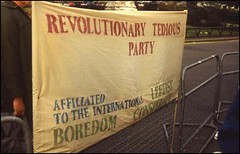By almost any meaningful performance measurement, the U.S. economy in the 20th century performed better under Democratic administrations than under Republican ones. Reflecting on this seeming paradox, Christopher Carroll suggests that
perhaps the best explanation has to do with attitudes, not doctrines: Maybe capitalism works better when its excesses are restrained by skeptics than when true-believers are writing, interpreting, judging, and executing the rules of the game. (The Democrats are surely the more skeptical of our two parties).
Most would agree that restraining the excesses of almost anything counts as good sense, but this is only a preliminary step toward a bigger and more interesting idea:
Capitalism works better when it is being held accountable to some external standard than when left to its own devices.
The whole system works better when "held accountable to some external standard," when it is, in a word, constrained. Optimal performance, in other words, is the fruit of struggle. Make things too easy and performance declines.
 Relaxed external standards? Check. Highlight reel material? Not so much.
Relaxed external standards? Check. Highlight reel material? Not so much.Consider how effective coaches pull outstanding athletic performance from their players. Good coaches don't let their players do whatever they want, without accountability or oversight; they create rules and systems of accountability. A good soccer coach makes you use your weak foot in order to develop it. A good swimming coach pushes you to hold your breath longer. Optimal athletic performance depends upon the measured application of psychological and physiological pressure. (Go watch Gavin O'Connor's
Miracle to see a dramatization of great coaching.) Good coaches don't remove limitations--they
use them.
Or consider architectural and industrial design.
The famous designer
Charles Eames (yet another famous St. Louisan) once remarked:
Design depends largely on constraints.
We tend to believe that creativity is best served by removing constraints. If we could just somehow make the process of invention
easier for the inventor, we imagine that she would be
more inventive. But the opposite is usually true. People get creative--truly creative--when challenged to negotiate constraints. Budgets (within reason) push architects to develop new strategies to solve old problems. (The
story of how the design of Seattle's new public library building developed is a great example.) The particularities of manufacturing processes push industrial designers to find solutions which challenge convention. (The story of the how the
first commercially viable computer mouse was designed is a textbook example.) Constraints drive creativity.
 Artist Andy Goldsworthy creates astonishing ephemeral works using only the materials he finds on site during his wilderness hikes: creativity driven by constraint.
Artist Andy Goldsworthy creates astonishing ephemeral works using only the materials he finds on site during his wilderness hikes: creativity driven by constraint.The same is true
in business. Real innovation happens where someone discovers a new way to scratch an old itch, where someone thinks through a problem in a new way (even if it's simply a new application of an old technology). When we talk about innovation happening "at the edges" of a market or industry, what we mean is that innovation happens where business rubs up against constraints. (The "mainstream" of anything is where things flow smoothly, right?) We can't have innovation--and capitalism's greatest strength as an economic system is its powerful incentives for innovation--unless we have the right kind of rules and restrictions. (The question of "more" regulation versus "less" regulation is puerile. The
kind of regulation matters more than the amount.) The free market, to put it pointedly, is only as free as its constraints
force it to be.
Of course, constraints are damned inconvenient. And that's precisely the point. It's often--if not always--in response to inconveniences that people are most creative, most inventive, most innovative. And so we're led inevitably to the conclusion that
inconveniences can be useful.
 "Traffic lights are just the Man keeping us down! We will not be constrained!"
"Traffic lights are just the Man keeping us down! We will not be constrained!"Some inconveniences, naturally, are more useful than others, but that hardly obviates the necessity of inconvenience for optimal performance. It's easy enough to see how inconveniencing others might be worthwhile, but it's one of the marks of emotional maturity to see the value of inconvenience for oneself. Politics--in the largest possible sense of the word--is only possible because we deliberately accept to be inconvenienced in certain ways (e.g., we don't simply use whichever car is closest, use guns to force our crushes to go out with us, or lynch elected officials from opposing parties). We recognize that our condition is collectively better when we all accept to be inconvenienced in certain ways. (Again, the
kind of self-regulation matters more than the amount.)
Finding--and enforcing--the right kind of constraints is key to getting the most out of people, as innovators, as politicians, as artists, as designers, and even as citizens. We would all of us do well to remember that inconvenience--yes, even our own--often serves us much, much better than convenience.





